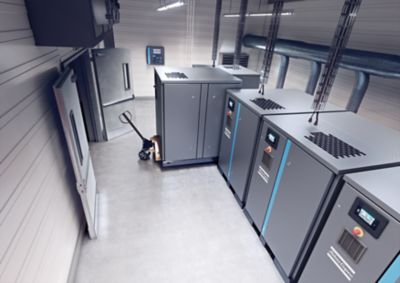Compressed air accounts for a significant part of total energy costs for industrial manufacturers - typically about 12% and maybe as high as 40% in some facilities. This means that any compressed air energy savings that you can achieve will have a big impact on your factory’s total energy consumption and CO2 emissions. Our 10 best practice tips will help you reduce your running costs through making your compressor installation more energy efficient now and for the years to come.
Reasons why you should download this guide
-
Find out more about:
- How to reduce your compressor's unloaded running hours.
- How to reduce the pressure band.
- How a compressed air audit will show you ways to improve efficiency.
- How to eliminate air leaks.
- How to turn compression heat into useful energy with heat recovery.
- How to reap the benefits of modern compressed air equipment.
- How to ensure the correct size of compressor and the right compressor technology is installed.
- Get to know the impact of regular maintenance
- And much more
A brief overview of the guide
Our 10 best practice tips will help you reduce your running costs through making your compressor installation more energy efficient now and for the years to come.
1. Reduce unloaded running hours
Air demand in an industrial compressed air system typically fluctuates. Using these patternsto reduce unloaded running hours is a first step to optimising energy efficiency. Compressor controllers offer user-friendly ways to reduce unloaded running hours. If you have multiple compressors, then they should have been setup to do this automatically. But if there is no central controller, then the compressor pressure bands should have been set up in a cascade method, and the on-board controllers will...
2. Eliminate air leaks
Leakages are the biggest source of energy waste in older compressed air systems, with a leakage point as small as 3mm costing an estimated £980/week in wasted energy. It is estimated that up to 20% of total compressed air consumption may be lost through leaks.
If you are still working on site and have some spare time, we recommend taking the opportunity to...
3. Reduce the pressure band
As a rule of thumb for most compressors, a reduction of 1 bar in pressure (14.5 psi) could lead to a 7% saving in electricity consumption. The pressure settings of the compressor should be adjusted until the lowest pressure can be reached and the pressure band reduced without affecting the applications.
For centralised systems utilising multiple compressors, by using a central controller, the network can be set to run...
4. Turn compression heat into useful energy with heat recovery
One area that offers manufacturers a significant opportunity for savings is to recover the waste heat from air compressors. Without energy recovery, this heat is lost into the atmosphere via the cooling system and radiation. The amount of electrical energy that can be recovered depends on the size of the compressor and the running hours. Typical recoveries are between 70-94%. It is estimated that...
5. Ensure the correct size of compressor is installed
Choosing the wrong size air compressor for your facility can lead to problems with production and or increased costs due to wasted energy. When choosing the right type of compressor, you should ask yourself these questions:
• What is the application
• How much air flow does my facility/workshop use
• What is the minimum pressure needed within the facility
• Do I need clean/dry air (use of dryer and filters)
• How many hours per year does my compressor operate
• How many shifts do I run per day
• Is there fluctuation in flow demand between shifts (if so, a VSD compressor could be a good option and offer great savings)
• Are there any plans for future expansion
Once you have answered those questions, select your compressor not based solely on the initial purchase price, but based on the one with the lowest total lifecycle costs. Since 70% of the total LCC of a compressor is spent on energy, the right choice will add up to a significantly reduced....
Want to continue reading the information in the guide? Please fill in the form below to download the full guide.

Do you have any questions?
Aside from the negative impact of CO2 production on the environment, we understand that manufacturers have the financial burden of energy usage. Energy costs can account for 80% of the total lifecycle costs of running an air compressor. We can help you reduce that! Just give us a call or drop us an email and one of our experts will get back in touch with you.
Atlas Copco Compressors UK, Swallowdale Lane
Hemel Hempstead
HP2 7EA united kingdom


